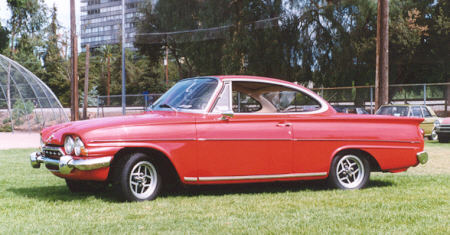|
|

|
Porsche, and the Porsche crest are registered trademarks of Dr. Ing. h.c. F. Porsche AG.
This site is not affiliated with Porsche in any way. Its only purpose is to provide an online forum for car enthusiasts. All other trademarks are property of their respective owners. |
|
|
| Ferg |
 Jan 11 2006, 08:59 PM Jan 11 2006, 08:59 PM
Post
#1
|
|
914 Guru      Group: Members Posts: 5,948 Joined: 8-January 03 From: Boulder CO Member No.: 116 Region Association: None 
|
Since I enjoy Gustl's quiz's so much thought I would try one of my own...
What is this (IMG:http://www.914world.com/bbs2/html/emoticons/biggrin.gif) Attached image(s) 
|
  |
Replies
| goose2 |
 Jan 11 2006, 09:37 PM Jan 11 2006, 09:37 PM
Post
#2
|
|
Senior Member    Group: Members Posts: 976 Joined: 30-March 05 From: Eugene, Oregon Member No.: 3,847 Region Association: Pacific Northwest |
More than you ever wanted to know about the Consul Capri:
The Ford Consul Classic 315 and Capri 335 were produced by Ford UK and intended to be the flagship mid-size car, positioned between the old Prefect and the MKII Zephyr. Originally planned to appear before the new 105E Anglia, a shortage of the older sidevalve engines meant the new `Kent' engined small car was needed first, and the Consul Classic 315/ Capri 335 were put on hold while the development of the Anglia was pushed forward. The Classic 315 / Capri 335 were styled at `Dagenham by Dagenham people' (Ford UK), however the design borrowed heavily from the styling products of Dearborn (Ford US). This combination resulted in the radical styling that now clearly evokes the fab 60's. This Capri was the first European Ford with that name. It was aimed squarely at the export market and the first few weeks' -production was for overseas sale only. The Capri made it's show debut on the Frankfurt Automobil Ausstellung in September 1961 on a Stand full of Ford-Germany Taunuses. On the opening day 86 Capris were sold and the marketing men were talking optimistically of sales of 2000 units during 1962. Well, from the waist down, the Capri was identical to the two door Classic apart from minor changes to the doors to accommodate a different type of winding mechanism. The tremendous difference in appearance was the replacing of the saloon roof section with a streamlined coupé top, whose rear window was raked 40 deg. from the horizontal; the lower roof line reduced overall height by 2 in. The Capri had better front seats than the Classic, but the nominal rear seats in the shape of a thinly padded shelf more suited to carriage of luggage since there was restricted headroom. Crushions to cover this platform were optional extras which only slightly mitigated the medicore comfort complained of by road testers. The semi-elliptic rear side windows gave a foretaste of the style that was to distinguish a later car called Capri and wound down flush with the rear sill to create a pillarless coupé. Other interior trim differences giving the Capri the edge over the Classic. A fitted nylon carpet and white sequinned PVC headlining were fitted as standard. Driving controls and instruments were identical to those of the Classic but the steering wheel was lowered by 0.5 in. The reduced top-hamper improved the handling and road-testers remarked that the Capri "is not much affected by cross-winds". In common with the Classic, the Capri gained the new 1500 ccm engine in July 1962 to counteract criticism of poor low-speed flexibility. On February 21, 1963, a new performance variant of the Capri, the GT, was unveiled in response to an important movement to get "more fun into motoring, more liveliness, more performance". Modifications to the engine - fitting a twin-choke Weber carburettor, four branch outlet and modified inlet manifold, larger exhaust valves, and a Keith Duckworth designed high-lift camshaft - raised the power by over 30 per cent, torque by 12 per cent and increased the useful rev band by 500 rpm. A remote floor shift was fitted and a supplementary instrument panel carried rev-counter, ammeter and oil pressure gauge. The front discs were now servo assisted so that harder pad material could be used. At only £ 115 more than the standard model, the Capri GT offered excellent value for money and remained in production after the standard Capri had been withdrawn, though the final year's sales of only 412 units hardly seemed worth the efforts. |
Posts in this topic
 Ferg OT: what car is this? Jan 11 2006, 08:59 PM
Ferg OT: what car is this? Jan 11 2006, 08:59 PM
 Midtowner An Australian Ford? Also, that looks like a very ... Jan 11 2006, 09:14 PM
Midtowner An Australian Ford? Also, that looks like a very ... Jan 11 2006, 09:14 PM
 Ferg on the right track...
rear shot Jan 11 2006, 09:19 PM
Ferg on the right track...
rear shot Jan 11 2006, 09:19 PM
 Lou W It looks about the same size as a Comet or Fairlai... Jan 11 2006, 09:25 PM
Lou W It looks about the same size as a Comet or Fairlai... Jan 11 2006, 09:25 PM
 goose2 Ford Consul Capri http://www.9... Jan 11 2006, 09:29 PM
goose2 Ford Consul Capri http://www.9... Jan 11 2006, 09:29 PM
 Ferg Yep, Ford Consul Capri.
man that was fast Jan 11 2006, 09:46 PM
Ferg Yep, Ford Consul Capri.
man that was fast Jan 11 2006, 09:46 PM
 Midtowner Yeah, were good, really good. ... Jan 11 2006, 09:46 PM
Midtowner Yeah, were good, really good. ... Jan 11 2006, 09:46 PM  |
2 User(s) are reading this topic (2 Guests and 0 Anonymous Users)
0 Members:

|
Lo-Fi Version | Time is now: 20th October 2024 - 12:46 AM |
Invision Power Board
v9.1.4 © 2024 IPS, Inc.







